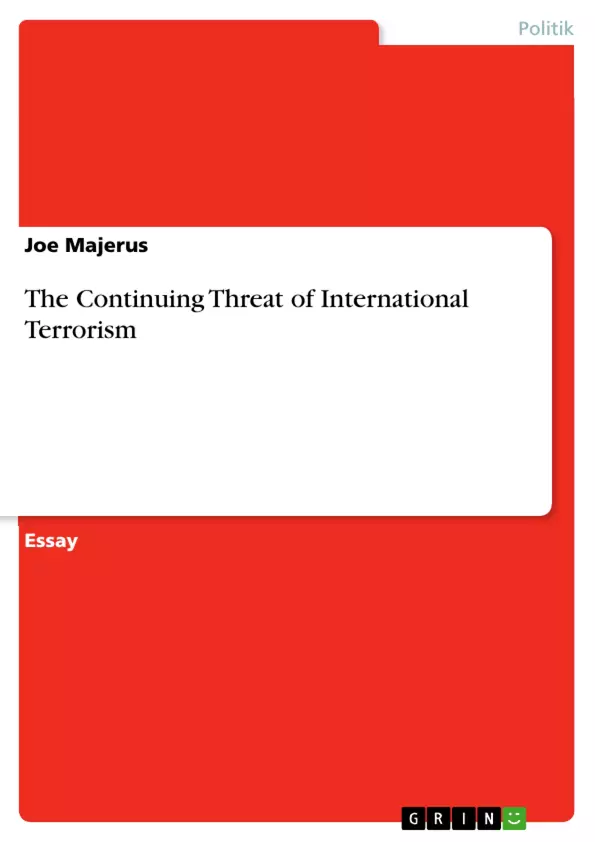The text is a short outline on terrorism and its continuous threat. The author discusses threats to humanity and possible actions to prevent further terrorism.
Inhaltsverzeichnis
- Die anhaltende Bedrohung durch internationalen Terrorismus
- Terrorismus und die westliche Welt
- Die Gefahr eines Terrorstaates
- Die Verbreitung von Massenvernichtungswaffen
- Die Bedrohung durch nukleare Proliferation
- Strategien zur Bekämpfung von Terrorismus
Zielsetzung und Themenschwerpunkte
Diese Arbeit befasst sich mit der anhaltenden Bedrohung durch internationalen Terrorismus und untersucht die verschiedenen Aspekte, die diese Bedrohung weiterhin relevant machen. Sie analysiert die Herausforderungen, die der Terrorismus für die internationale Sicherheit darstellt, und beleuchtet die Strategien und Ansätze, die zur Bekämpfung des Terrorismus eingesetzt werden können.
- Die anhaltende Bedrohung durch Terrorismus trotz des Rückgangs von Al-Qaida und ISIS
- Die Unterschiede und Herausforderungen von Klein- und Großterrorismus
- Die Gefahr von Terrorstaaten und die Verbreitung von Massenvernichtungswaffen
- Die Bedeutung der nuklearen Proliferation und die Notwendigkeit, diese zu verhindern
- Die Notwendigkeit multidimensionaler Ansätze zur Bekämpfung des Terrorismus, die über militärische Maßnahmen hinausgehen
Zusammenfassung der Kapitel
Das erste Kapitel beleuchtet die anhaltende Bedrohung durch internationalen Terrorismus und analysiert die Gründe, warum diese Bedrohung trotz des Niedergangs von Al-Qaida und ISIS weiterhin besteht. Das Kapitel untersucht insbesondere die Unterschiede und Herausforderungen von Klein- und Großterrorismus sowie die Gefahr von Terrorstaaten und die Verbreitung von Massenvernichtungswaffen.
Das zweite Kapitel befasst sich mit der Bedrohung durch nukleare Proliferation und diskutiert die Notwendigkeit, diese zu verhindern. Es untersucht die Gefahren, die mit einer möglichen Verwendung von Atomwaffen durch Terroristen verbunden sind, und die Bedeutung von diplomatischen und politischen Maßnahmen zur Stabilisierung von Krisengebieten.
Das dritte Kapitel widmet sich den Strategien zur Bekämpfung des Terrorismus. Es analysiert die Grenzen militärischer Ansätze und betont die Notwendigkeit multidimensionaler Ansätze, die über militärische Maßnahmen hinausgehen. Das Kapitel untersucht die Bedeutung von politischen und ideologischen Ansätzen sowie die Wichtigkeit, den Rekrutierungsmechanismen von Terrororganisationen entgegenzuwirken.
Schlüsselwörter
Internationaler Terrorismus, Al-Qaida, ISIS, Klein- und Großterrorismus, Terrorstaaten, Massenvernichtungswaffen, nukleare Proliferation, Terrorismusbekämpfung, Strategien, Ansätze, politische und ideologische Maßnahmen, Rekrutierung, Propaganda, Sicherheitsbedrohung, internationale Sicherheit.
Häufig gestellte Fragen
Warum bleibt internationaler Terrorismus trotz des Rückgangs von ISIS und Al-Qaida eine Bedrohung?
Die Bedrohung besteht weiterhin durch die Anpassungsfähigkeit von Terrororganisationen, die Gefahr von Terrorstaaten und die Verbreitung von Massenvernichtungswaffen.
Was ist der Unterschied zwischen Klein- und Großterrorismus?
Die Arbeit analysiert die spezifischen Herausforderungen beider Formen, wobei Großterrorismus oft staatliche Strukturen oder Massenvernichtungswaffen involviert.
Welche Gefahr geht von nuklearer Proliferation aus?
Es besteht die Gefahr, dass Terroristen Zugang zu nuklearen Materialien oder Waffen erhalten, was diplomatische und politische Gegenmaßnahmen erforderlich macht.
Sind militärische Maßnahmen allein zur Terrorismusbekämpfung ausreichend?
Nein, die Arbeit betont die Notwendigkeit multidimensionaler Ansätze, die auch politische, ideologische und soziale Strategien umfassen.
Wie kann man der Rekrutierung von Terroristen entgegenwirken?
Wichtig sind Ansätze, die der Propaganda entgegenwirken und die Rekrutierungsmechanismen der Organisationen auf ideologischer Ebene schwächen.
- Citar trabajo
- Joe Majerus (Autor), 2016, The Continuing Threat of International Terrorism, Múnich, GRIN Verlag, https://www.grin.com/document/343577



